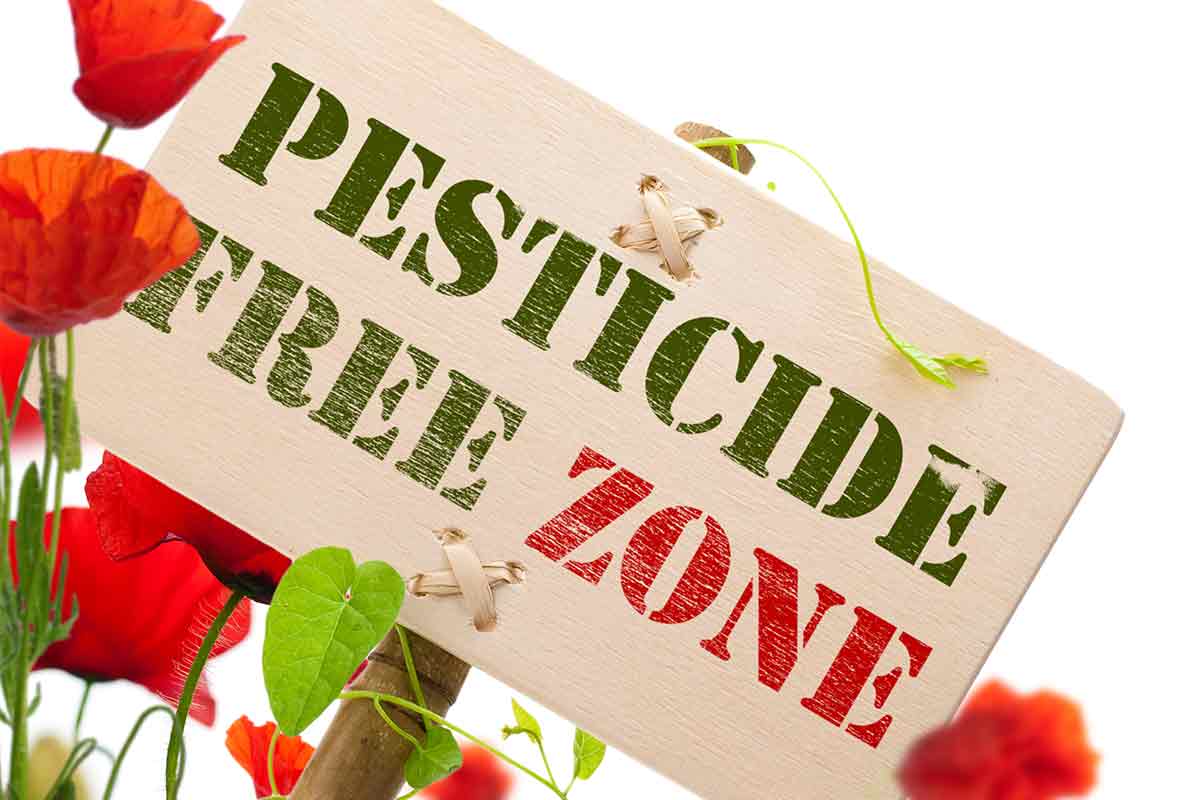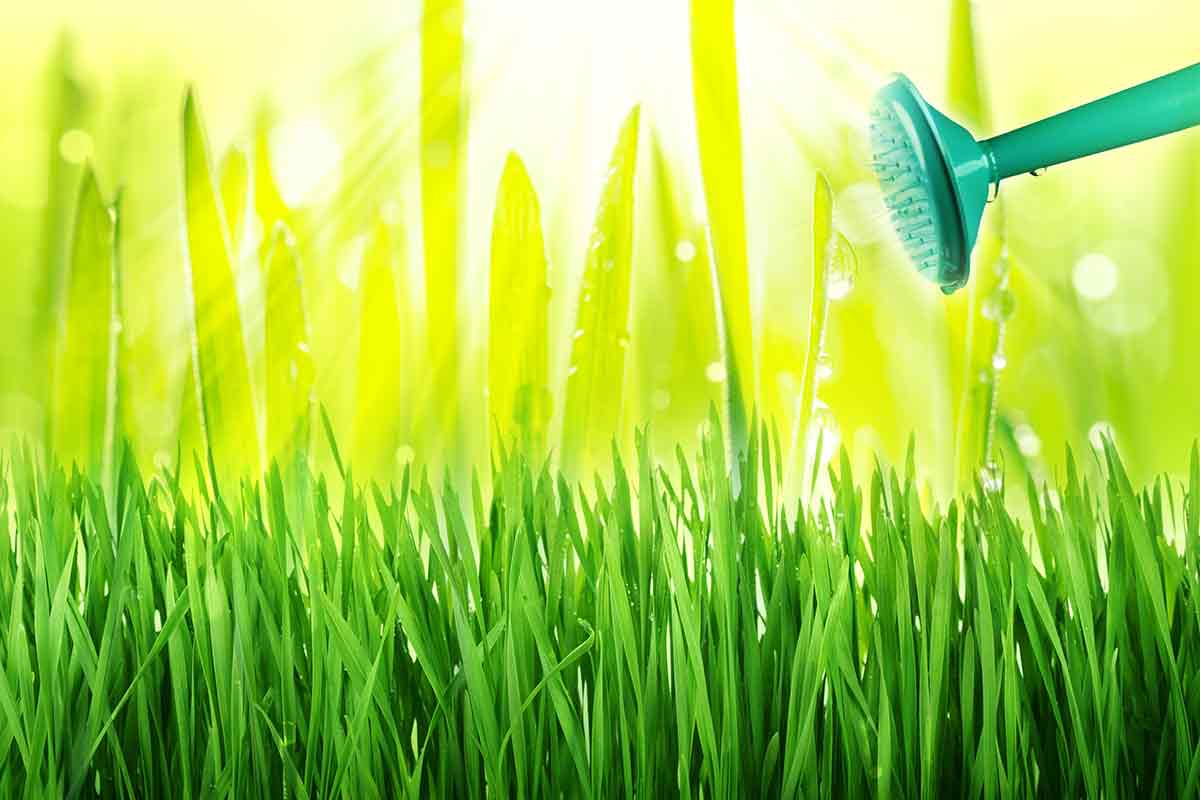Our companies are backed by the Best Pick Guarantee. Call one today!
I remember watching the technician walk around the yard with a backpack fogger spraying every inch of grass. I looked down at my dog begging to go outside and it hit me—this precious pup has been rolling around in unknown synthetic pesticides, herbicides, insecticides, and fertilizers. After spending half an hour reading horrifying articles on the dangers of lawn chemicals, I decided organic was the way to go.
If you’ve got children or pets, you may want to consider safer ways to manage your lawn. Yes, those chemicals help hone the fluffy green grass that makes your home look so good, but is it worth it?
In this article, you’ll get information on:
- Why you should care about the chemicals you’re using to treat and fertilize your lawn.
- The long-term benefits of low-maintenance, chemical-free lawn care.
- What to look for when selecting an organic lawn care service.
- How natural lawn care works and common natural solutions used to handle issues when they arise.
Why You Should Care About the Chemicals You’re Using on Your Lawn
Unhealthy for you and your family
The synthetic chemicals used to treat many lawns pose significant health threats. Beyond Pesticides created an informational chart listing the dangers of the 30 most commonly used pesticides:
- 7 are linked to cancer
- 13 can cause endocrine disruption
- 21 have reproductive effects
- 13 can cause neurotoxicity
- 25 bring on kidney and liver damage
- 26 act as sensitizers and irritants
- 12 can result in birth defects
Exposure is possible through the skin, mouth, and inhalation. If you’ve got kids or pets crawling around on your lawn, chances are they’ve come into contact with at least a few of these pesticides. Children are especially at risk as their bodies and organs are growing and developing. What’s really scary is that many of the chemical materials sprinkled on your lawn are designed to stay there for months at a time.
Bad for the environment

Chemical options are also hazardous for the environment. The runoff pollutes waterways and contributes to increased algae growth, creating issues with local water supplies. It can also cause issues for wildlife in the area, like birds. Those chemicals you’re using are ingested by the grubs and worms that birds eat and can consequently kill them.
Short-term fix vs. long-term solution
Outside of the health and environmental dangers, it really boils down to whether you’re interested in a short-term fix or a long-term solution that addresses the overall health of your lawn and its soil.
Most chemical treatments damage and degrade the soil, which is counterproductive to the development of healthy turf. They also leave your lawn more vulnerable to:
- Drought
- Insect infestations
- Disease
- Thatch buildup
- Soil compaction
Treating your lawn with natural solutions offers a long-term solution aimed at creating a healthy soil that encourages healthy grass growth. Over time, natural lawn care is more sustainable, less expensive, and will eventually require less maintenance (less water, fertilizer, pesticide, herbicide, insecticide).
Selecting an Organic Lawn Care Service
Be ready to ask some specific questions in your search for an organic lawn care service.
Look for:
- Transparency. How long will it take to see results? What are those expected results? What ingredients are in the products used?
- Flexibility. Can they tailor their treatments to best fit your situation? Each lawn and soil situation is different, so a one-size-fits-all approach is often not the most effective one.
- Expertise. Are they members of any associations? Do they have any certifications?
- Services. Can they address all of your needs?
- Reputation. Do they have good rapport among their customers? Forget the guess work—hire a Best Pick company. We’ve done the research for you, and we guarantee their work.
Be wary of:
- A company that offers organic treatment options but urges you not to use them. Once effective, organic solutions are more sustainable over time and require less maintenance.
- Bio-based, natural-based, organic-based, and green treatments. These solutions are not organic and still contain chemicals.

Ask what they use for:
- Pre-emergent weed control
- Grub and insect control
- Weed control
- Fertilizer
Can they tell you:
- What ingredients are in their fertilizer?
- The right types of grass for your region?
- The pH of your soil?
- The organic lawn care process?
Wondering if you should DIY or call in a professional? Read about why hiring a lawn care service is worth it.
How Does Natural Lawn Care Work?
Organic lawn care is all about developing healthy soil that promotes grass growth. Here are the major tenets of natural lawn care:
- Mow high and leave your grass clippings
- Water deeply and less frequently
- Test the pH of your soil
- Use natural solutions when necessary
Disclaimer: It’s going to take some time for the natural approach to do its thing. It may take several growing seasons (sometimes up to three years) to become fully effective.
Mow high
Keep your mower blades sharp, and set them high. Taller grass results in:
- Deeper roots. With deeper roots, you can water your grass deeply and less frequently.
- More shade. You’ll be able to water less frequently, which is good for keeping weed growth at bay.
- Thicker turf. Your lawn will look better and have fewer weeds.
- Slower growth. Believe it or not, mowing high leads to slower growth (which means less frequent mowing for you!).
- Grass clippings. Leave the grass clippings. It may not be as pretty, but it’ll return nutrients (nitrogen) to your soil.
Water deeply and early

Water your lawn deeply (one inch) and early in the day; this gives your lawn time to absorb the water before it gets too hot. Watering deeply encourages deep root growth that’s deeper than most weed roots.
When the blades of grass start to curl, it’s time to water your lawn. You can also use a shovel to see if there’s moisture within the top six inches of top soil. If it’s super dry, water half an inch, wait about an hour and a half, and then water another half an inch.
An additional benefit of watering more deeply but less often is better soil quality since frequent watering washes away nutrients.
Soil analysis
The key to a luscious lawn is healthy soil. Have a professional test the pH (acidity and alkalinity) of your soil so you have an idea of what you’re working with. If weeds have infiltrated your lawn, you might be able to use those weeds to diagnose issues with your soil.
Things to keep in mind:
- An ideal pH level is between 5.5 and 7.5. Use lime to increase and gardener’s sulfur to decrease the pH of your soil.
- The more top soil the better. Your top soil should be four inches deep at a minimum.
- Leave the grass clippings. Grass clippings will give your soil the nitrogen it needs.
If your lawn and soil have too many issues, your best option may be to start over. It requires some time and patience, but you can start over by adding at least four inches of top soil and new seed.
Natural solutions
Your soil is at the right pH, you’re mowing high, and you’ve got your lawn maintenance schedule down—why are there still weeds plaguing your lawn? Organic lawns have problems too, but there are natural solutions.
Common natural solutions for lawn maintenance:
- Fertilizer – corn gluten meal, a thin compost layer, or moldy hay
- Pre-emergent weed control – corn gluten meal
- Grub and insect control – milky spore or nematodes
- Weed control – plant-based products
These are just a few of the natural treatments out there. There are many homemade and organic fertilizer/insecticide/herbicide/pesticide options for you to choose from.
Bottom Line
- The chemicals you use on your lawn are dangerous for your family and the environment.
- Organic lawn care is a long-term, low-maintenance solution.
- Be ready to ask some questions in your search for an organic lawn care professional.
- Mow high, water deeply, test your soil, and use natural solutions when issues emerge.


























